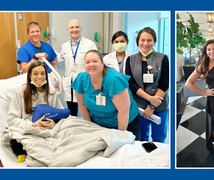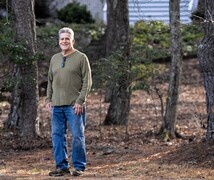After undergoing a minimally invasive procedure to repair his aortic valve, Ben Lee said, “I felt so good so quickly that I wondered why I didn’t have this done sooner.”
Ben Lee has had his fair share of heart problems, yet none slowed him down for long. Four years ago, however, the 81-year-old from Calabash, NC, thought he’d finally met his match.
“I couldn’t keep up with the guys on the golf course,” he says. “I wasn’t myself – far from it. There was some discomfort, and I couldn’t be as active as I would’ve liked. That really ate at me and I just reached a point where something had to be done.”
Lee’s cardiologist in Wilmington discovered Lee had a narrowing of the aortic valve, which was restricting blood flow and causing his symptoms. He suggested Lee look into a minimally invasive procedure being performed at Duke as part of a clinical trial. The procedure required only a few small incisions, and resulted in less scarring and blood loss, and a faster recovery when compared to open heart surgery. “He had been taking care of me for many years, so when he endorsed this procedure at Duke, that was my first clue that it might be the answer to my problems,” says Lee.
The second “clue” was the feeling Lee got when he met interventional cardiologist Kevin Harrison, MD. “He had the kind of demeanor that told you he knew his job as a cardiologist, but also that he was a straight shooter. I could trust him,” says Lee. “When I made my decision, I knew there was only one place I was coming – to Dr. Harrison and his team.”
The skilled specialists at Duke Heart Center successfully replaced Lee’s faulty aortic valve with a novel device called a CoreValve using transcatheter aortic valve replacement (TAVR). Because he underwent the minimally invasive procedure, Lee was out of the hospital in a few days, a stark contrast to the weeks of recovery required for his quadruple bypass surgery 20 years prior.
“I felt almost as if it were a miracle,” says Lee. “I felt so good so quickly that I wondered why I didn’t have this done sooner.”





